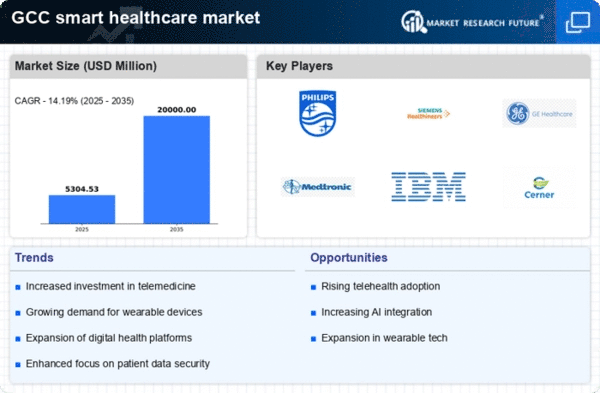The GCC Smart Healthcare Market is characterized by rapid technological advancements, increasing health awareness, and a growing demand for efficient healthcare solutions. This market is fueled by the integration of digital health technologies, including telemedicine, artificial intelligence, and the Internet of Things, which contribute to improved patient care and operational efficiency.
The competitive landscape is marked by both global players and regional enterprises vying for market share, driving innovation and investment in smart healthcare solutions. The region's healthcare systems are under pressure to upgrade their infrastructure, adopt electronic health records, and utilize data analytics for better decision-making.
Thus, companies are focusing on developing products that cater specifically to the needs of the GCC countries, ensuring compliance with local regulations while also addressing the unique healthcare challenges faced by these nations.
Medtronic has established a strong presence in the GCC Smart Healthcare market, leveraging its advanced medical devices and technology offerings. The company focuses on providing innovative solutions that enhance patient care, particularly in areas such as chronic disease management, surgical procedures, and remote patient monitoring.
Medtronic's strengths lie in its robust product portfolio that includes life-saving devices and healthcare IT solutions tailored for the GCC region's healthcare landscape. Furthermore, the company benefits from strategic partnerships with local healthcare providers and institutions, facilitating the delivery of comprehensive healthcare solutions that meet the specific demands of patients and practitioners alike.
By continuously investing in research and development, Medtronic maintains its competitive edge, ensuring that its offerings remain at the forefront of medical technology innovation in the GCC.
IBM Watson Health is another key player in the GCC Smart Healthcare Market, known for its emphasis on data-driven health solutions and artificial intelligence. The company's core offerings include advanced analytics tools, patient engagement platforms, and precision medicine solutions designed to enhance healthcare outcomes.
IBM Watson Health leverages its expertise in data processing and machine learning to create actionable insights for healthcare professionals, aiding them in clinical decision-making and personalized care. In the GCC region, the company has engaged in collaborations with healthcare institutions to implement its technology, resulting in improved patient management and operational efficiencies.
Furthermore, IBM Watson Health is known for its strategic mergers and acquisitions aimed at expanding its capabilities and market share in the GCC, positioning itself as a leader in digital healthcare transformation. This approach, combined with its comprehensive suite of products and services, allows IBM Watson Health to effectively address the growing demands of the region's healthcare sector.




















Leave a Comment